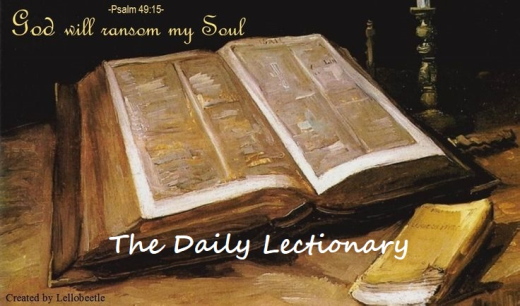The Daily Lectionary
WEDNESDAY, August 12, 2020
Psalm 28; Genesis 40:1-23; Matthew 8:23-27
(Revised Common Lectionary Year A)
(Semicontinuous Reading Plan)
God hears my pleadings
1 To you, Lord, I call;
you are my Rock,
do not turn a deaf ear to me.
For if you remain silent,
I will be like those who go down to the pit.
2 Hear my cry for mercy
as I call to you for help,
as I lift up my hands
toward your Most Holy Place.
3 Do not drag me away with the wicked,
with those who do evil,
who speak cordially with their neighbors
but harbor malice in their hearts.
4 Repay them for their deeds
and for their evil work;
repay them for what their hands have done
and bring back on them what they deserve.
5 Because they have no regard for the deeds of the Lord
and what his hands have done,
he will tear them down
and never build them up again.
6 Praise be to the Lord,
for he has heard my cry for mercy.
7 The Lord is my strength and my shield;
my heart trusts in him, and he helps me.
My heart leaps for joy,
and with my song I praise him.
8 The Lord is the strength of his people,
a fortress of salvation for his anointed one.
9 Save your people and bless your inheritance;
be their shepherd and carry them forever.
The dreams of two prisoners
40:1 Some time later, the cupbearer and the baker of the king of Egypt offended their master, the king of Egypt. 2 Pharaoh was angry with his two officials, the chief cupbearer and the chief baker, 3 and put them in custody in the house of the captain of the guard, in the same prison where Joseph was confined. 4 The captain of the guard assigned them to Joseph, and he attended them.
After they had been in custody for some time, 5 each of the two men—the cupbearer and the baker of the king of Egypt, who were being held in prison—had a dream the same night, and each dream had a meaning of its own.
6 When Joseph came to them the next morning, he saw that they were dejected. 7 So he asked Pharaoh’s officials who were in custody with him in his master’s house, “Why do you look so sad today?”
8 “We both had dreams,” they answered, “but there is no one to interpret them.”
Then Joseph said to them, “Do not interpretations belong to God? Tell me your dreams.”
9 So the chief cupbearer told Joseph his dream. He said to him, “In my dream I saw a vine in front of me, 10 and on the vine were three branches. As soon as it budded, it blossomed, and its clusters ripened into grapes. 11 Pharaoh’s cup was in my hand, and I took the grapes, squeezed them into Pharaoh’s cup and put the cup in his hand.”
12 “This is what it means,” Joseph said to him. “The three branches are three days. 13 Within three days Pharaoh will lift up your head and restore you to your position, and you will put Pharaoh’s cup in his hand, just as you used to do when you were his cupbearer. 14 But when all goes well with you, remember me and show me kindness; mention me to Pharaoh and get me out of this prison. 15 I was forcibly carried off from the land of the Hebrews, and even here I have done nothing to deserve being put in a dungeon.”
16 When the chief baker saw that Joseph had given a favorable interpretation, he said to Joseph, “I too had a dream: On my head were three baskets of bread. 17 In the top basket were all kinds of baked goods for Pharaoh, but the birds were eating them out of the basket on my head.”
18 “This is what it means,” Joseph said. “The three baskets are three days. 19 Within three days Pharaoh will lift off your head and impale your body on a pole. And the birds will eat away your flesh.”
20 Now the third day was Pharaoh’s birthday, and he gave a feast for all his officials. He lifted up the heads of the chief cupbearer and the chief baker in the presence of his officials: 21 He restored the chief cupbearer to his position, so that he once again put the cup into Pharaoh’s hand— 22 but he impaled the chief baker, just as Joseph had said to them in his interpretation.
23 The chief cupbearer, however, did not remember Joseph; he forgot him.
Jesus stills the storm
8:23 Then he got into the boat and his disciples followed him. 24 Suddenly a furious storm came up on the lake, so that the waves swept over the boat. But Jesus was sleeping. 25 The disciples went and woke him, saying, “Lord, save us! We’re going to drown!”
26 He replied, “You of little faith, why are you so afraid?” Then he got up and rebuked the winds and the waves, and it was completely calm.
27 The men were amazed and asked, “What kind of man is this? Even the winds and the waves obey him!”
Optional parts of the readings are set off in [square brackets.]
The Bible texts of the Old Testament, Epistle, and Gospel lessons are from The Holy Bible, New International Version®, NIV® Copyright ©1973, 1978, 1984, 2011 by Biblica, Inc.® Used by permission. All rights reserved worldwide.
The Daily Lectionary is a three-year cyclical lectionary. We are currently in Year A. Beginning with the first Sunday of Advent in 2020, we will be in Year B. The year which ended at Advent 2019 was Year C. These readings complement the Sunday and festival readings: Thursday through Saturday readings help prepare the reader for the Sunday ahead; Monday through Wednesday readings help the reader reflect and digest what they heard in worship. Revised Common Lectionary Daily Readings, copyright © 2005 Consultation on Common Texts. www.commontexts.org
The Daily Lectionary for WEDNESDAY, August 12, 2020
Psalm 28; Genesis 40:1-23; Matthew 8:23-27








